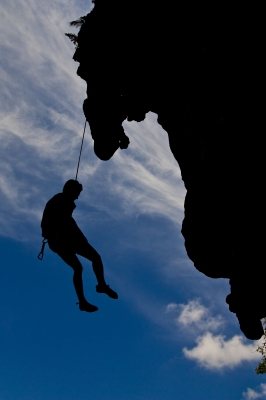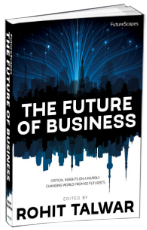22 Oct Extreme Sports In The Age Of Fear Fetishism
 Climber Dallin Smith and his girlfriend are depicted chilling out in their self-made lawn chairs that they attached 350 feet high on a cliff wall in Utah. You can look at the amazing pictures here. Smith weaved his own lawn chairs and explains “the springs aren’t bolted in. They just rest nicely in a crack.” Did someone say “death wish”?
Climber Dallin Smith and his girlfriend are depicted chilling out in their self-made lawn chairs that they attached 350 feet high on a cliff wall in Utah. You can look at the amazing pictures here. Smith weaved his own lawn chairs and explains “the springs aren’t bolted in. They just rest nicely in a crack.” Did someone say “death wish”?
It might be one of the biggest paradoxes of our generation of parents and fits Generation X to a tee. Generation X’ers are rough and tough pragmatists born into the cultural chaos of a new social operating system. Many of us have made it our life project to create order out of disorder, of which a great part goes through over-protecting our children from various harms. At the same time we have established and popularized leisure time activities and entertainment concepts that have far more in common with roman gladiator shows than with Yo Gabba Gabba. Pretend for a moment that you are a martian witnessing the bizarre behavior of a middle-aged guy who is imposing on himself the trauma of a 10-mile military training circuit carrying a 35 lbs rucksack, military boots, going through mud, ice baths, barbed wire and electric shocks. Upon returning home all bloody and sweaty, he reunites with his little princess whom he never lets out of sight lest she stumbles and skins her knee while he turns his muscular back for a split second. You will catch him carefully examining her Halloween candy for poison and razor blades which she received at her neighbor’s doors while his watchful eyes followed her trick-or-treating from the safe distance of the sidewalk curb. “You just never know.” And after dishing out his hard earned money to earn whipping commands from his ruthless bootcamp instructor at 5 am, God forbid if his children’s coaches ruffle their feathers or fails to hand them a trophy at the end of the season, regardless of performance.
I’m no psychoanalyst, but there seems to be another paradox at play here. Could the seeming schizophrenia of seeking personal risks all while going great lengths in protecting your own progeny from harm be the effect of what is called risk compensation? Risk compensation is a theory which tries to understand the behavior of people engaging in potentially hazardous activities. It refers to the tendency of people to adjust their behavior in response to the perceived level of risk, behaving less cautiously where they feel more protected and more cautiously where they feel a higher level of risk (Wikipedia).
The popularity of extreme sports has increased in parallel with our rapidly developing safety obsession in other areas. While Generation X went through childhood fairly unprotected, they live their adult years worrying about “today’s childhood” which seems ‘so much more dangerous these days’. (Seriously, for most Americans childhood is no more dangerous today than it was in the years of second-hand smoke and seatbelt free cars). Could it be that parents now seek risk homeostasis by subjecting themselves to thrilling experiences they could never imagine letting their own kids do?
Try asking a Generation X parent what is his or her most exhilarating childhood memory and they will tell you stories of doing pranks like ring and run in the dusk, diving from tall cliffs and conversing with eccentric strangers in unsupervised places. Let the same stories be told by their kids and that twinkle in the parents’ eyes would quickly turn to terror.
Partly driven by the news-as-entertainment juggernaut, partly by market researchers finding new niches of profit in the endless well of parental fear, have we reached a point where we are so scared of our own shadows around our kids that we are about to suffocate their free movement to an extent we would never tolerate for own rugged selves?
Ironically, at the same time as we grown-ups find new creative ways to cure our mountain climbing vertigo, we are tarnishing these same beautiful stone formations for the sake of safety-proofing the great outdoors for our children. By coincidence that was the main story at Free Range Kids today. We sure live in a time of great paradoxes.
Images: Sura Nualpradid @ FreeDigitalPhotos.net


Mick Gordon
Posted at 18:52h, 09 NovemberFear is not a fetish, it is an addiction – or you might say the garnish on a really satisfying experience made sweeter by wondering if it might be your last. life takes on this really intense clarity and purpose then. Check out extreme sports – caving https://www.youtube.com/watch?v=7NBC64NvL6Q
Anne Boysen
Posted at 21:06h, 09 NovemberHi Mick. Thanks for your response. I can sort of understand the addiction part – although I will admit I wouldn’t go into those caves myself!And I hope I don’t have to reflect on a joyous moment being my last one 🙂
I probably should have elaborated more what I mean with the term “fear fetishism”. I often refer to the trend of increasing fear in society, especially among parents or our propensity to feel that “everything is so much more dangerous now”. I call it fetishism because fear is now so powerful that it can bring significant profits to various industries. Many people also use fear as a yardstick for how responsible (read: good) they are as parents. Just one example, I recently read a comment thread on a parenting website which discussed the appropriate age at which children can go trick-or-treat rounds without adults on Halloween. What ensued was a string of comments that seemed to be self-flattery based on protectiveness. People would actually one-up each other based on how much they protected their children on Halloween. The fact that virtually all credible stats show that there this day is no more dangerous than others seemed to go unnoticed.
It was in this context I wanted to contrast our peculiar tendency to deliberately seek danger in extreme sports while at the same time fetishizing the various perceived dangers of daily life.